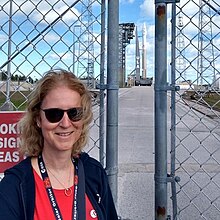Louise Harra

Louise Harra is a Northern Irish physicist, born in Lurgan, County Armagh, Northern Ireland. She is the Director of PMOD/WRC [1][2] and affiliated professor at the Institute of Particle Physics and Astrophysics of the ETH.
Education[]
Louise Harra was born in County Armagh, and she attended later Banbridge Academy.[3]
She graduated from The Queen's University of Belfast with a BSc (Hons) in Applied Maths and Physics and a PhD in Physics.
Academic career and research interests[]
She was a professor of solar physics at University College, London's Mullard Space Science Laboratory[4][5] until 2019, with much of her career being involved in space instruments. She was principal investigator (PI) of the EUV Imaging Spectrometer instrument on the Hinode spacecraft from 2006-2019. She is co-PI of the Solar Orbiter EUV Imager.
In 2019 she moved to take on the position of director at PMOD/WRC and affiliated professor at ETH-Zurich.
Harra's research interests include solar flares and coronal mass ejections, formation of the solar wind and Sun-Earth connection. Her research makes use of spectroscopic and imaging observations to quantify the characteristics and behaviour of solar flares and the solar wind.
Space missions[]
Harra has been involved in a number of space missions in her career. These include:
- The Japanese/US/UK space mission Yohkoh, Instrument Scientist based in Japan.
- The JAXA/NASA/UK/ESA mission Hinode, Principal Investigator of the EUV Imaging Spectrometer.
- The ESA/NASA Solar Orbiter mission,[2][6] co-Principal Investigator for the EUV Imager.
Media[]
Harra has given radio and TV interviews. These include:
- 2014 Radio 4, 'In our time' interview with Melvyn Bragg[7]
- 2014 Australian Broadcasting Corporation Science Show with Robyn Williams
Awards[]
- 2017: Robinson medal presented by Armagh Observatory.[8]
- 2016: Daiwa-Adrian prize for UK-Japan research.
- 2015: RAS group achievement award for the Hinode EIS instrument.
- 2014: The Sir Arthur Clarke Award, Space Achievement (Academic Study/Research) for her leadership in the UK and internationally of the exploitation of data from the Japanese Hinode spacecraft and her leadership of the upcoming EUI telescope on Solar Orbiter.[9]
- 2014: The Royal Astronomical Society's Chapman Medal, for single investigations of outstanding merit in solar-terrestrial physics, including geomagnetism and aeronomy.[10]
- 2003: Philip Leverhulme Award– this award, in the Astronomy and Astrophysics category, recognises young scholars of substantial distinction and promise.
See also[]
References[]
- ^ "Prof. Louise Harra". Retrieved 26 January 2021.
- ^ Jump up to: a b Amos, Jonathan (30 January 2020). "Sun's surface seen in remarkable new detail". BBC News. Retrieved 26 January 2021.
- ^ J Michael T Thompson, ed. (26 October 2005). Advances In Astronomy: From The Big Bang To The Solar System. p. 390. ISBN 9781783260195.
- ^ "Louise Harra". ucl.ac.uk. 2014. Retrieved 22 July 2014.
- ^ "Iris View Profile". iris.ucl.ac.uk. Retrieved 22 July 2014.
- ^ Stewart, Linda (6 February 2020). "Meet the Northern Ireland astrophysicist hoping to shed new light on the Sun". Belfast Telegraph. Retrieved 26 January 2021.
- ^ "In Our Time Interview on The Sun".
- ^ "The 2018 Robinson Lecture: Professor Louise Harra tells us about how astronomers research the Sun – Astronotes".
- ^ "Winners of the 2014 awards".
- ^ "Winners of the 2014 awards, medals and prizes - full details". ras.org.uk. 2014. Retrieved 22 July 2014.
Awards, Medals and Prizes
- Living people
- British physicists
- British women physicists
- People educated at Banbridge Academy
- People from Banbridge
- Academics of UCL Mullard Space Science Laboratory
- Alumni of Queen's University Belfast
- Space scientists
- Women space scientists
